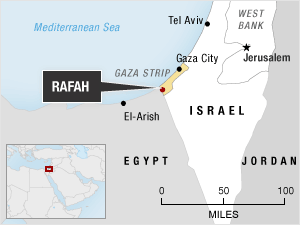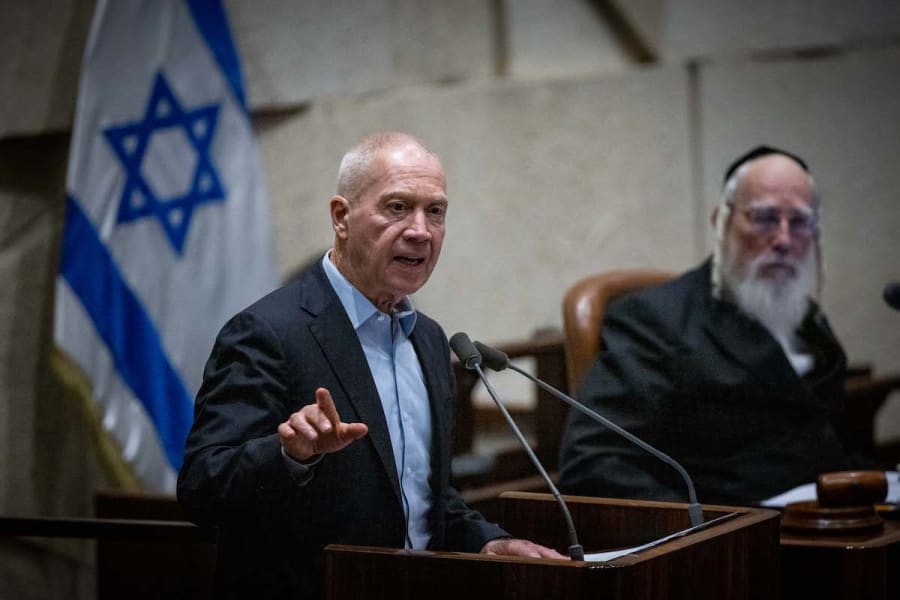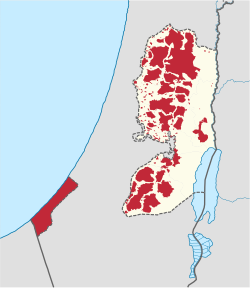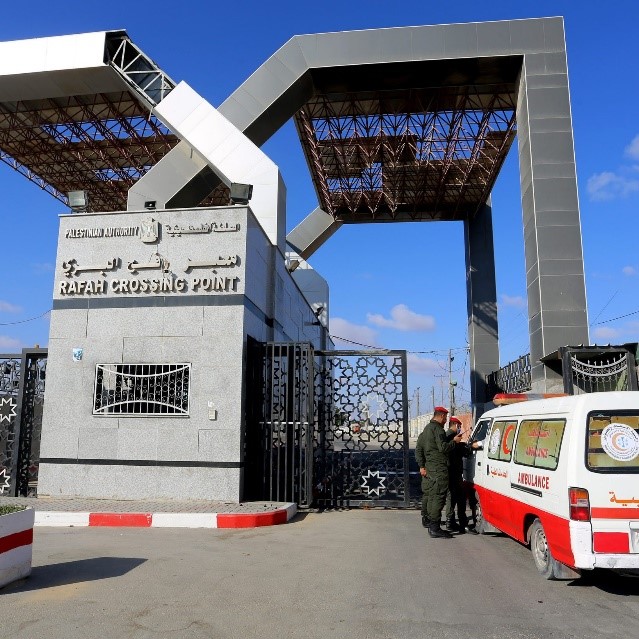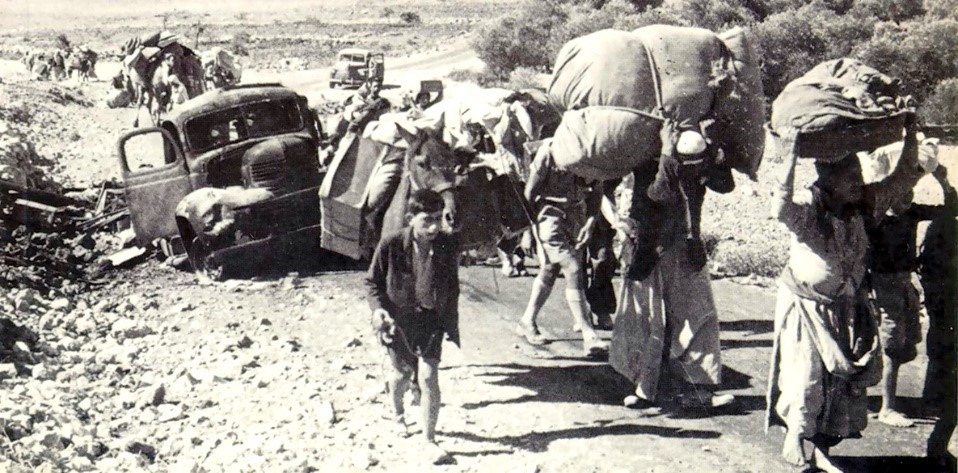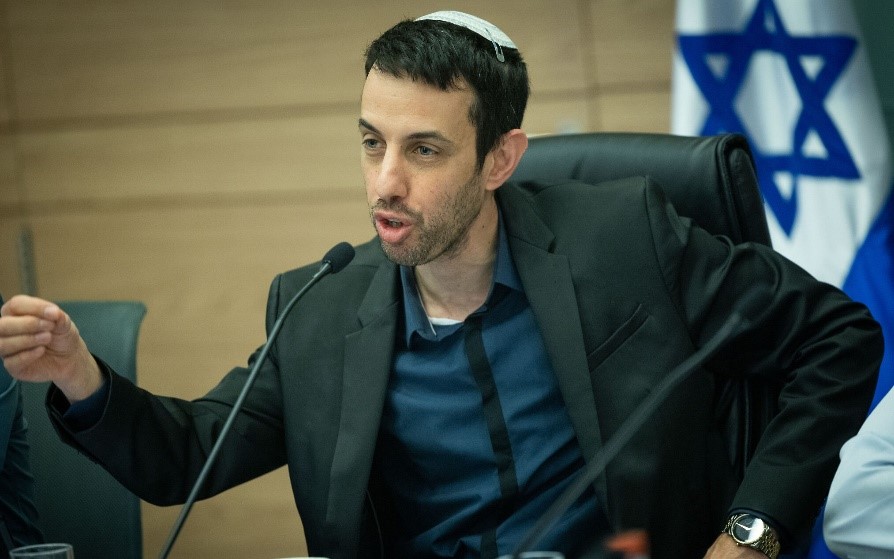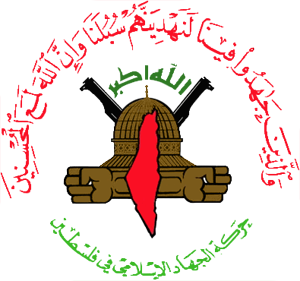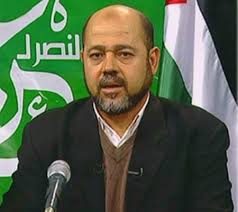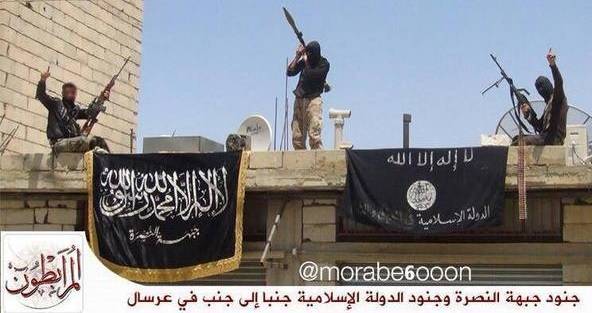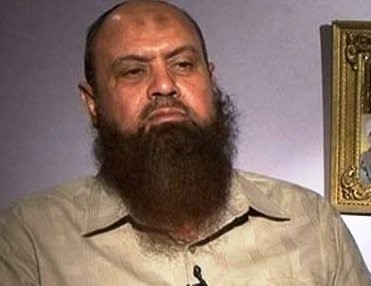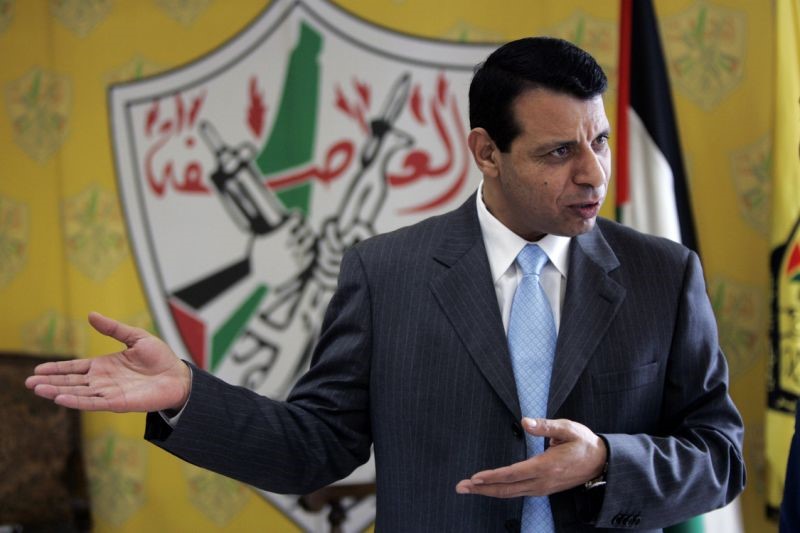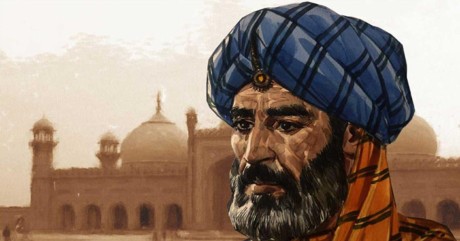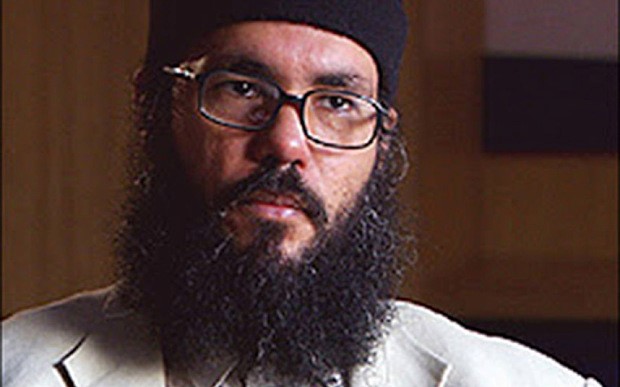Terrorism Monitor Volume: 22 Issue: 2
Andrew McGregor
January 31, 2024
(NPR)
Executive Summary
- Nearly all of Gaza’s 2.2 million people have been displaced by the current conflict, with Israel potentially considering “voluntary” resettlement plans for the Gazan population.
- Various Israeli officials have proposed several such plans for the removal of Gazans to other nations like the Democratic Republic of the Congo or Egypt, which they have justified by declaring that Gazans’ main desire at this point is to destroy Israel.
- Egypt has firmly rejected Israeli proposals to resettle Gazans in its country, equating any “voluntary” resettlement to illegal forced displacement. In particular, relocating the Gazan population to the Sinai is felt by Cairo to risk peace between Egypt and Israel.
In January 2008, Hamas fighters blasted holes through the border wall separating Gaza and Egypt to allow hundreds of thousands of starving Palestinians to access food and fuel supplies in Egypt. The incursion occurred five days after Israel imposed a complete blockade on Gaza, following a series of Hamas rocket attacks. Egyptian security forces backed off to alleviate the growing humanitarian crisis, but forced the Gazans back across the border several days later (Al Jazeera, January 24, 2008).
Now, sixteen years later, Israel may be seeking a more permanent repetition of this incident by forcing nearly all of Gaza’s 2.2 million people into the Egyptian Sinai. Some 1.9 million Gazans are now displaced, with little or nothing to return to when the bombing stops (United Nations Office for the Coordination of Humanitarian Affairs, January 4). In this context, high-level Israeli discussions regarding the “voluntary” resettlement of Gaza’s Palestinian population have become an indicator of the Israeli government’s war objectives.
Israeli Plans for Transferring Gazans to Sinai and Beyond
Schemes to transfer Gaza’s population to Sinai have appeared repeatedly since the 1950s, but the Sinai is not the only place to have been considered as a destination for Gaza’s Arabs. Israel’s Likud government is reported to be engaged in secret negotiations with several nations to accept displaced Gazans, most notably the Democratic Republic of the Congo, a nation beset by environmental crises, humanitarian challenges, political instability, and ceaseless internal warfare (Times of Israel, January 3).
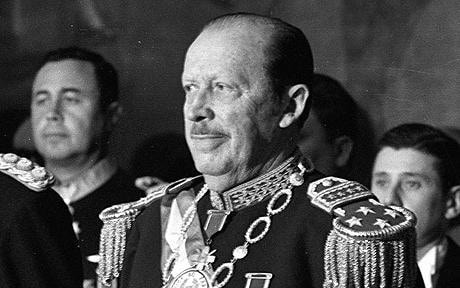 General Alfredo Stroessner, Dictator of Paraguay
General Alfredo Stroessner, Dictator of Paraguay
A secret 1969 plan to encourage Gazans to migrate to Paraguay was only revealed in 2020. Negotiated by Israel’s Mossad intelligence agency with Paraguayan dictator and Nazi sympathizer Alfredo Stroessner, the deal called for 60,000 Palestinians to move to the South American nation. However, ultimately, only 30 Palestinians did so, two of whom stormed the Israeli Embassy and killed the ambassador’s secretary (Jerusalem Post, August 12, 2020).
 Israeli Intelligence Minister Gila Gamliel (X)
Israeli Intelligence Minister Gila Gamliel (X)
On January 2, Intelligence Minister Gila Gamliel outlined a post-war plan to take control of the Egypt–Gaza border. She noted that by war’s end, there will be no municipal authorities in Gaza, no source of work, a 60 percent decline in agricultural land, and a complete dependency on humanitarian aid. All these conditions encouraged “voluntary emigration” (Times of Israel, January 3).
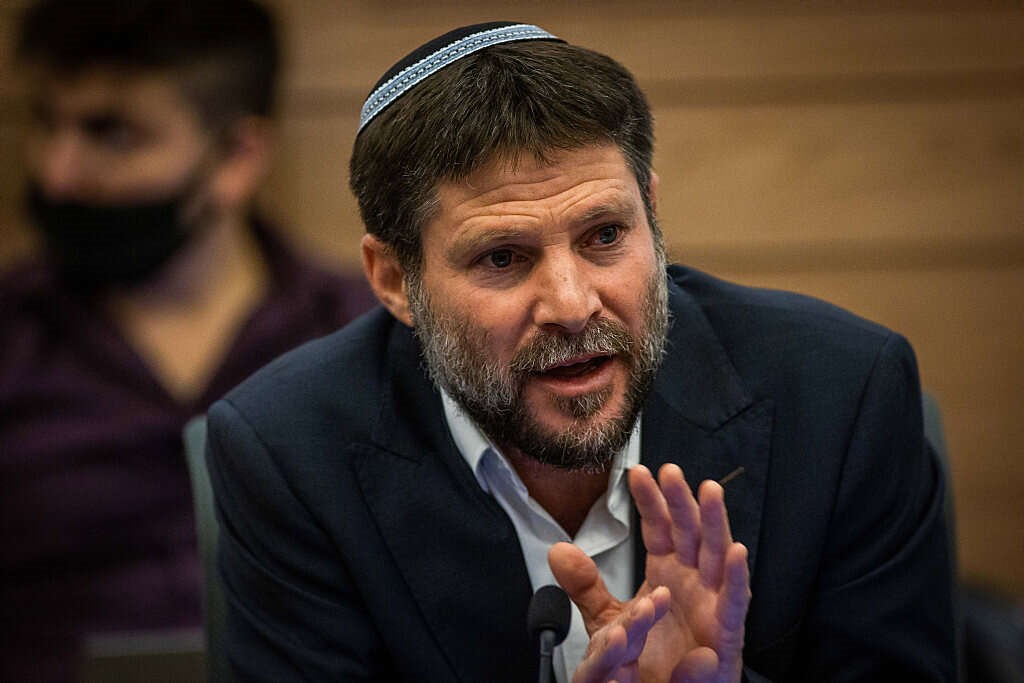 Israeli Minister of Finance Bezalel Smotrich (Israel Hayom)
Israeli Minister of Finance Bezalel Smotrich (Israel Hayom)
Minister of Finance Bezalel Smotrich (of the Religious Zionist Party), National Security Minister Itamar Ben Gvir (of the Otzma Yehudit Party) and numerous members of the Likud Party have also advocated the external resettlement of Gazans and their replacement with Israeli settlers. Smotrich justified the “voluntary” emigration by claiming “two million [Gazans] wake up every morning with a desire to destroy the State of Israel and to slaughter, rape, and murder Jews” (Jerusalem Post, January 3). However, these calls do not have universal support in the Israeli government, with two Likud ministers describing them as “unrealistic” and damaging to Israel’s international reputation (Times of Israel, January 4).
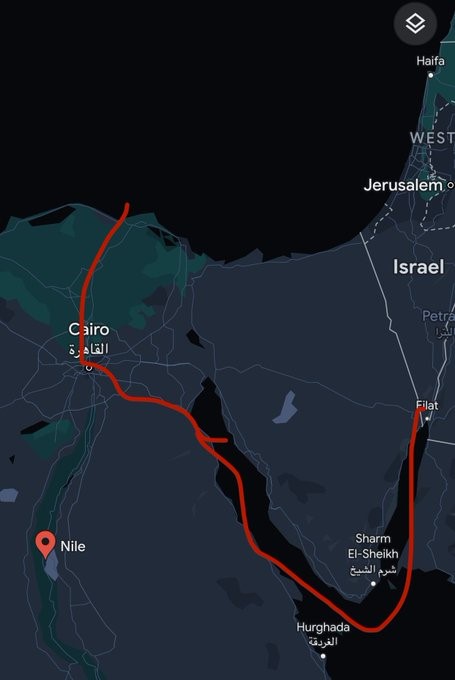 “An Integral Part of Israel” – Israel’s Projected New Western Border
“An Integral Part of Israel” – Israel’s Projected New Western Border
In mid-December, extremist Rabbi Uzi Sharbaf, a founding member of banned Israeli terrorist group “The Jewish Underground” (HaMakhteret HaYehudit), told a Tel Aviv conference attended by Knesset members that Jewish settlements must return to Gaza as part of an historic opportunity to “liberate” biblical lands from the Sinai up to the Nile River (Jordan News, December 15, 2023; Al-Ahram [Cairo], December 14, 2023). This “unique and rare opportunity to evacuate the entire Gaza Strip” was also cited in an October 17 paper released by former senior defense and intelligence officials of the Misgav Institute for National Security and Zionist Strategy. Rather than the Sinai, the plan called for the resettlement of Gazans in existing housing in the Cairo satellite cities of “6 October” and “10 Ramadan” that would be purchased by Israel at a cost of $8 billion. [1]
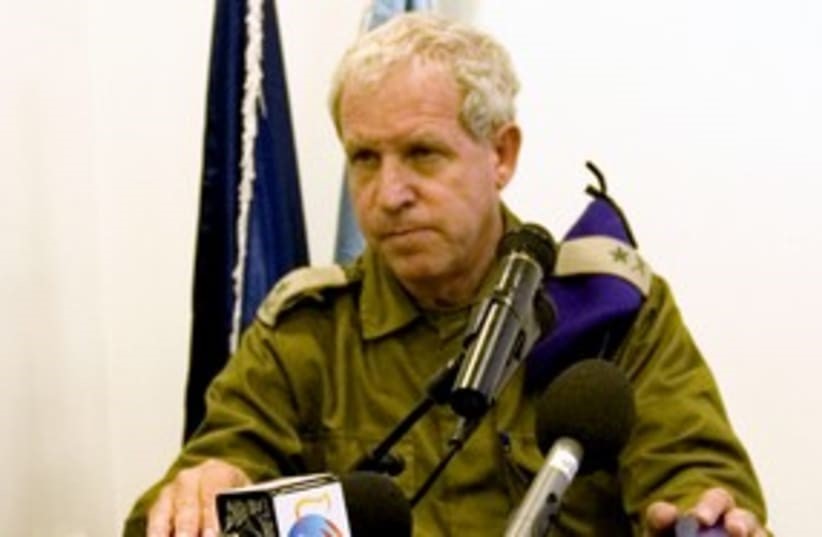 General Giora Eiland (Jerusalem Post)
General Giora Eiland (Jerusalem Post)
Giora Eiland, an influential retired IDF major-general and former head of the Israeli National Security Council who has compared Gaza to Nazi Germany, declared at the beginning of the current conflict that: “Israel needs to create a humanitarian crisis in Gaza, compelling tens of thousands or even hundreds of thousands to seek refuge in Egypt or the Gulf… Gaza will become a place where no human being can exist” (Ynetnews, October 12, 2023; Yedioth Ahronoth, November 19, 2023). Eiland has promoted a population transfer from Gaza to Sinai since 2004.
Egyptian Reactions
A leaked document from Israel’s Intelligence Ministry dated October 13 called for a permanent relocation of Gazans to Sinai, initially to tent cities, and then to more stable accommodation in the Sinai Peninsula, with a buffer zone along the border preventing their return to Gaza. The first step would consist of shifting the population to Gaza’s south. Egypt’s minister of foreign affairs, Sameh Shoukry, described the leaked document as “a ludicrous proposition,” noting that displacement was itself “an illegal activity” (Asharq Al-Awsat, November 4, 2023). Shoukry later denounced calls for a “voluntary” displacement as a “full-fledged war crime” (Al-Ahram [Cairo], November 21, 2023).
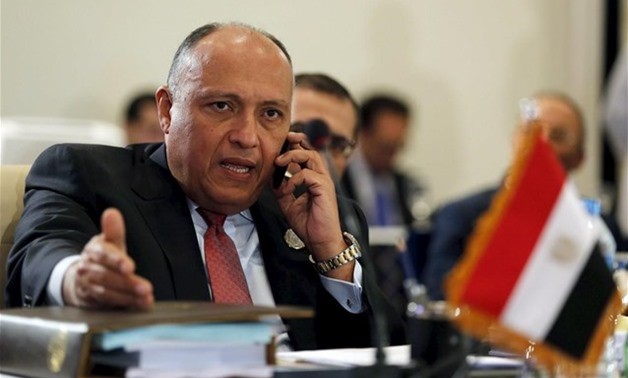 Egyptian Foreign Minister Sameh Shoukry (Daily News Egypt)
Egyptian Foreign Minister Sameh Shoukry (Daily News Egypt)
Israeli sources report that Israeli prime minister Benjamin Netanyahu suggested the World Bank write off Egypt’s considerable foreign debt (an estimated $165 billion) in return for accepting Gaza’s population (Yedioth Ahronoth, October 31, 2023). Some financial aid from the rich Gulf states might be included, but Egyptian authorities have loudly proclaimed their rejection of the deal (Egypt Independent, November 1, 2023). Egyptian prime minister Mustafa Madbouli has noted his government’s own plans to settle eight million Egyptians in the Sinai by 2050 (Al-Ahram [Cairo], November 23, 2023). [2]
Egypt fears that discontented and resentful Gazans might use Sinai as a base for attacks on Israel in contravention of the peace agreement between the two nations. President Abd al-Fatah al-Sisi has instead suggested that Israel transport the two million Gazans to Israel’s Negev Desert in the south of the country until they can be returned after the defeat of Hamas (Egypt Today, November 22, 2023).
Conclusion
Bitter divisions are already emerging in Israel’s war cabinet over the post-war destiny of Gaza’s people. The implications for Israel of a forced depopulation of Gaza are many, including international isolation, the collapse of the Abraham Accords, and even a renewal of hostilities with Egypt. So long as both Egypt and the Palestinians of Gaza reject the idea of resettlement, the scheme cannot be fulfilled without dangerous consequences for Israel’s future.
Notes:
[1] “A Plan for resettlement and final rehabilitation in Egypt of the entire population of Gaza: economic aspects,” Misgav Institute for National Security and Zionist Strategy, October 17, 2023. The paper was taken down from the web after an international backlash. See Middle East Eye, October 26, 2023.
[2] Cairo’s full plan for development in Sinai can be found here: “The New Republic Implements Comprehensive National Plan to Change Life in Sinai: The Land of Turquoise,” State Information Service, April 26, 2022, https://www.sis.gov.eg/Story/165520/Mega-Projects-on-every-inch-of-Sinai?lang=en-us

